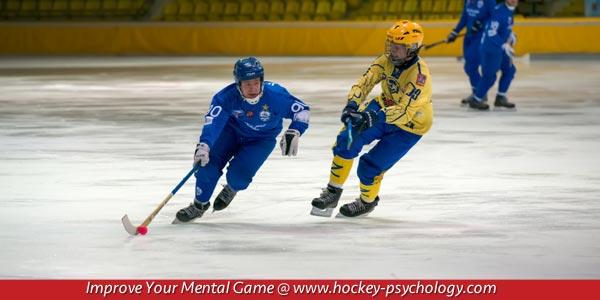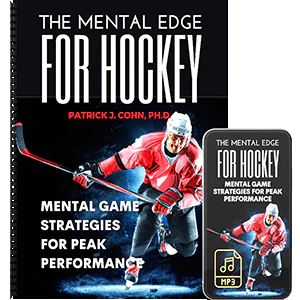
Letting Go of Mistakes in Hockey
What does a “short memory” refer to in terms of being a hockey player?
These terms do not mean forgetting what you have learned in practice or the game plan for an opponent.
Instead having a short memory refers to forgetting mistakes quickly–an asset for any hockey player.
Mistakes can haunt some players. Within a game, these players tend to dwell on the past and have difficulty refocusing their attention to the next play or shift.
In this instance, these players play tentative, fearful of making the same mistakes. They might worry about getting benched, losing playing time in future games, being blamed for losses or feeling embarrassed about their miscues.
In any case, the inability to move on from mistakes generally tends to lead to more mistakes on the ice–and playing safe.
Replaying mistakes after a game can likewise preoccupy a player’s mind and “mess with their head”…
These Players Have Difficulty Moving Forward After a Bad Game
They often beat themselves up after a bad performance, especially after a loss. The memories of bad games run through their heads as if it were a blooper reel.
The result of reliving bad games over and over is a blow to a player’s confidence. The amount of anxiety and fear of a repeat performance will also cause a player to be preoccupied at the start of the next game and very likely will lead to under performance.
A “short” memory is having the ability to let go of mistakes in the past in order to refocus on the play happening in the moment and having greater composure.
Having a short memory will be critical for the development of 19-year-old Vancouver Canucks goaltender Mikey DiPietro.
DiPietro made his NHL debut against the San Jose Sharks after the Canucks starting goaltender Jacob Markstrom experienced lower body tightness earlier in the day.
Unfortunately, DiPietro allowed seven goals on 24 shots and the Canucks lost 7-2.
After the game, DiPietro put a positive spin on his performance and seemed ready to learn and move on from the experience.
DiPIETRO: “Obviously, not the result you wanted, but it’s good to get the first one under the belt and, hopefully, as time goes on, get more and more comfortable. Just keep improving on my game… As the game wore on, I felt more and more comfortable, but it was a good experience for myself, a good stepping stone and definitely a good learning opportunity.”
To improve focus and preserve confidence, it is critical to learn how to let go of mistakes and learn how to improve.
How to Let Go of Mistakes:
“Catch and release” is a fishing term that refers to a fisherman capturing a fish and releasing the fish without taking it out of the water.
The fisherman uses barbless hooks so the fish are not injured. In fishing, “catch and release” is considered a technique of conservation.
Let’s apply the concept of “catch and release” to hockey.
Simply stated, after making a mistake and reflecting on that mistake, you want to “catch yourself” or be aware of your thoughts.
Next, you want to “release” or let go and move on to the next play.
To have a “short” memory, you can use the term “catch and release” as a cue to remind yourself to move on. Or you might use, “let it go” or “that’s in the past.”
The goal is to be non-judgmental about mistakes. You can’t focus on the mistake and play the shift in the moment–at the same time.
Related Articles on Hockey Mental Game:
- How to Process Mistakes Like a Pro
- Teaching Hockey Players to Let Go of Mistakes
- Overcoming Mistakes in Hockey
*Subscribe to The Sports Psychology Podcast on iTunes
*Subscribe to The Sports Psychology Podcast on Spotify
The Mental Edge for Hockey

The Mental Edge for Hockey teaches you proven and simple mental game strategies so you can overcome fear of failure, lack of confidence, slumps or poor composure, take your practice game to competition, and boost your confidence in hockey. You learn simple, actionable mental game strategies to help you perform at your peak!
I’ve worked with athletes for 30 plus years – and know the top challenges that undermine performance when you perform in games. Now you can tap into my expertise and experience in coaching hockey players on the mental game.
In this program, you’ll learn the TOP 10 mental training lessons for hockey players – the same strategies I teach one-on-one athletes I coach on the mental game. My clients pay thousands of dollars for personal coaching, but now you can have the same strategies to improve your mental game – at a fraction of the price.
Leave a Reply